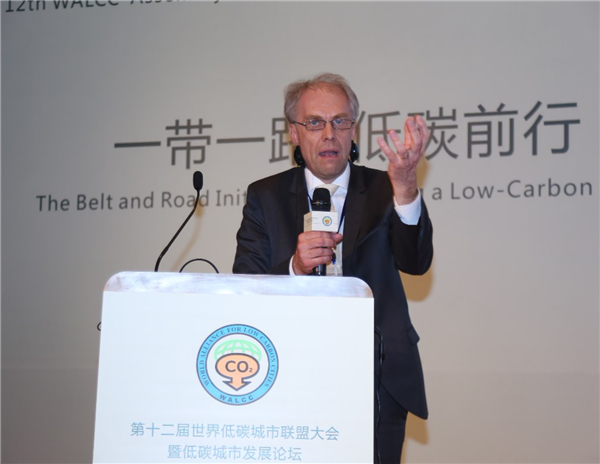The 12th World Alliance of Low Carbon Cities (WALCC) forum was held May 18 – 19 in the city of Sanya, Hainan province, China. The topic of the forum was “One Belt, One Road: moving towards low carbon.” The forum was primarily organized by Sanya Municipal People’s Government; the World Alliance of Low Carbon Cities; the Graduate School at Shenzhen, Tsinghua University Public-Private Partnership Research Center, Tsinghua-Berkeley Shenzhen Institute Laboratory for Low Carbon Economy and Financial Risk Analysis Research, Shenzhen Emissions Exchange, and China-Britain Business Council. Hainan Province Development and Reform Commission and Shenzhen Municipal Low Carbon Research Council assisted. Nearly 300 low carbon industry experts, Global Fortune 500 company representatives, renowned central enterprise representatives, government officials, low carbon researchers and scholars gathered in Sanya for the event. Leaders from the UK Department for International Trade, the British Consulate-General Guangzhou, Chinese government experts to the United National Climate Change Conference, China National Development and Reform Commission Macroeconomics Research Institute, National Family Planning Commissions Planning and Information Bureau, China Chamber of International Commerce Cooperative Development Bureau, and other government agencies brought extensive expertise and credibility to the forum.
WALCC Chairman and GSST Dean KANG Feiyu spoke at the opening ceremony. In reflecting on the history of the WALCC, Dean KANG emphasized the importance of connecting government, industry, academia, research, and capital with low carbon technology and creating a platform for low carbon urban development. In closing, Dean KANG expressed his hope that the world “listens to China’s call to low carbon development.”
WALCC Vice-chairman and GSST Professor KONG Ying presented on the connections between low carbon development, carbon trading, and public-private partnership financing models. Drawing on work done at Tsinghua University, Prof. Kong discussed the feasibility of using carbon trading and sustainable development to create “eco-civilized” cities.
This forum consisted of two plenary sessions, three breakout sessions, and three themed exhibitions. Over the course of the forum multiple awards and prizes were announced in recognition of individual, municipal, and industry achievements in advancing low carbon efforts. Among these prizes was the inaugural annual WALCC award recognizing leaders in the field of low-carbon development, which recognizes exemplary contributions in society’s progress in achieving low-carbon goals. The Cities of Edinburgh (Scotland), Espoo (Finland), Sanya and Fujian (China) were all awarded the “Annual Low Carbon Development City” title. Mayor of Espoo Jukka M?kel? and WALCC Chairman KANG Feiyu received awards for their work and influence in the field of low carbon development.
A “Sanya Declaration” signed by GSST, the China-Britain Business Council, the Shenzhen Emissions Exchange, and representatives from 11 other organizations and institutions was also issued at the forum. Signatories commit to creating sustainable economic growth and lowering carbon emissions by pursuing technological, industrial, system, and cooperative innovation.



